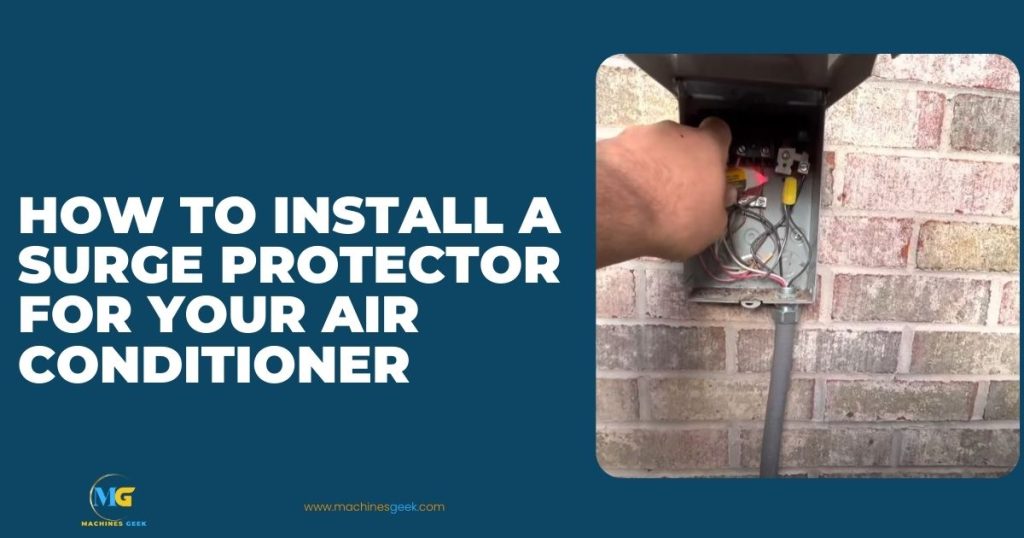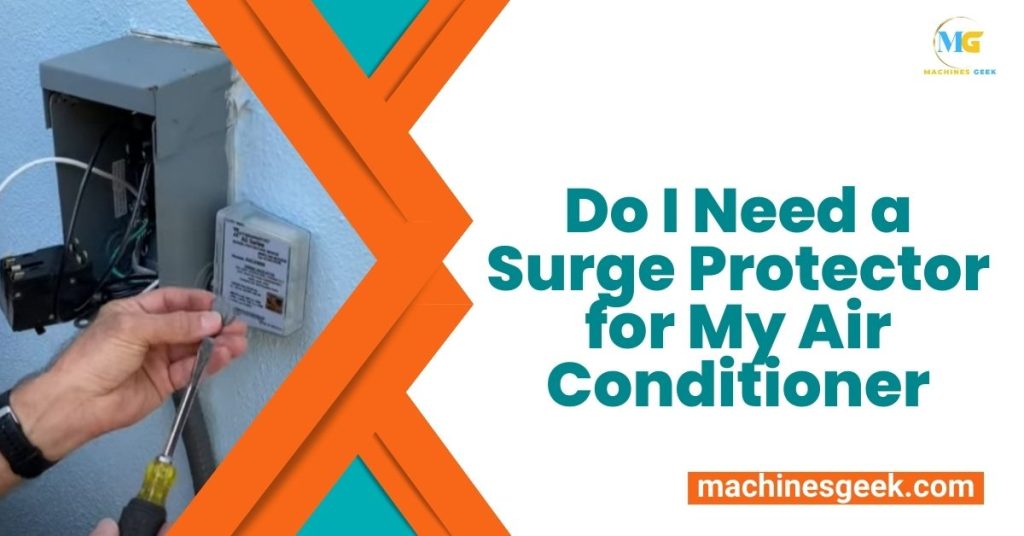Do I Need a Surge Protector for My Air Conditioner? Yes, a surge protector is necessary for your air conditioner as it safeguards against power surges and helps prevent damage to the appliance, ensuring its longevity and efficient performance. Now let’s delve deeper into why a surge protector is essential for your air conditioner.
Your air conditioner is a significant investment, and protecting it from power fluctuations is crucial. Power surges can occur due to lightning strikes, utility grid issues, or even when large appliances in your home, like refrigerators, turn on and off.
These sudden voltage spikes can cause irreparable damage to the delicate electronic components inside your air conditioner. By installing a surge protector, you provide a protective barrier between your air conditioner and these power surges.
The surge protector will automatically detect any surge in voltage and divert the excess electricity away, preventing it from reaching and potentially harming your cooling system. Consequently, a surge protector ensures the longevity and efficient operation of your air conditioner, saving you from costly repairs or premature replacement.
In addition to protecting your air conditioner, surge protectors also safeguard any connected devices, such as thermostats or smart home controllers, from potential damage. Thus, investing in a surge protector is a wise choice to safeguard your air conditioner and associated devices.
Choosing The Right Surge Protector For Your Air Conditioner
Power surges are a common occurrence in electrical systems that can cause significant damage to electronic devices, including air conditioners. That’s why it is important to invest in a surge protector for your air conditioner. Surge protectors work by diverting excess voltage away from your air conditioner, thus preventing damage to its sensitive components.
When it comes to choosing the right surge protector for your air conditioner, there are a few factors to consider. First, look for a surge protector that can handle the power requirements of your air conditioner, typically measured in amps. This information can usually be found in the user manual or on the unit itself.
Moreover, it is important to consider the joule rating of the surge protector. The joule rating indicates how much energy the surge protector can absorb before it fails. A higher joule rating means the surge protector can handle larger power surges and provide better protection for your air conditioner.
Additionally, look for a surge protector that offers multiple outlets, as this will allow you to protect other electronic devices as well. Some surge protectors also offer additional features like USB ports, which can be convenient for charging your devices.
| Benefits of Surge Protectors for Air Conditioners |
|---|
| 1. Protects sensitive electronic components from power surges. |
| 2. Prevents damage and extends the lifespan of your air conditioner. |
| 3. Provides peace of mind knowing that your air conditioner is protected. |
Remember, power surges can occur due to lightning strikes, utility company issues, or even just fluctuations in the power grid. So, investing in a surge protector for your air conditioner is a small price to pay for the peace of mind and protection it provides.
Types Of Surge Protectors
- Plug-in surge protectors
- Whole-house surge protectors
- Surge protector power strips
When it comes to protecting your air conditioner from power surges, investing in a surge protector is highly recommended. A power surge can cause irreversible damage to the delicate electronic components of your AC unit. There are three main types of surge protectors you can consider:
1. Plug-in surge protectors: These compact devices plug directly into a power outlet and provide protection from voltage spikes. They are typically designed to support a limited number of outlets and are an affordable option for individual AC units or smaller appliances.
2. Whole-house surge protectors: These are installed at the main electrical panel of your home and safeguard the entire electrical system, including your air conditioner. They are more expensive but offer comprehensive protection for all the electrical devices in your house.
3. Surge protector power strips: These surge protectors come in the form of power strips with multiple outlets. They can be positioned near your air conditioner and provide protection for both the AC unit and other electronic devices that are plugged into the power strip.
Investing in a surge protector appropriate for your air conditioner’s needs can help prevent damage caused by power surges, ensuring the longevity and optimal performance of your cooling system.
Factors To Consider When Buying A Surge Protector For An Air Conditioner
When considering buying a surge protector for your air conditioner, there are several important factors to take into account. One of the most crucial factors is the voltage rating of the surge protector. Ensure that the voltage rating matches or exceeds the voltage requirements of your air conditioner.
Another important factor is the joule rating. The higher the joule rating, the more energy the surge protector can absorb during a power surge.
Clamping voltage is also crucial to consider. This refers to the level at which the surge protector will start diverting excess voltage away from your air conditioner.
The response time of the surge protector is another important consideration. A faster response time means the surge protector will activate more quickly when a power surge occurs.
Additionally, consider the number of outlets on the surge protector. Make sure there are enough outlets to accommodate your air conditioner and any other devices you want to protect.
Lastly, check the cord length of the surge protector to ensure it reaches your air conditioner without needing an extension cord.
Benefits Of Using A Surge Protector For Your Air Conditioner
Using a surge protector for your air conditioner offers several advantages. Firstly, it protects against power surges and fluctuations that can occur during lightning storms or power outages. These sudden spikes in electricity can cause irreversible damage to your air conditioner’s sensitive components.
Secondly, a surge protector extends the lifespan of your air conditioner. By acting as a barrier, it absorbs excessive electricity and prevents it from reaching your AC unit, thus reducing wear and tear on the internal circuits.
Furthermore, a surge protector prevents damage to other connected electronics. When a power surge occurs, it can also affect devices that are plugged into the same electrical outlet. By using a surge protector, you can safeguard your television, computer, or other appliances from potential harm.
Finally, using a surge protector gives you peace of mind. Knowing that your air conditioner is properly protected allows you to relax during stormy weather or electrical disturbances, without worrying about potential damages.
How To Install A Surge Protector For Your Air Conditioner

Locating the main electrical panel is the first step to installing a surge protector for your air conditioner. The main electrical panel is usually found in the basement, garage, or utility room.
Before installing the surge protector, it is crucial to turn off the power to the air conditioner. Locate the circuit breaker that corresponds to the air conditioner and switch it off to ensure safety.
After turning off the power, securely mount the surge protector near the main electrical panel. Ensure proper grounding and follow the manufacturer’s instructions for installation.
Connecting the air conditioner and other devices to the surge protector
Connect the power cable from the air conditioner and other devices to the surge protector. Make sure all connections are secure and tight to prevent any electrical issues.
Once all connections are made, restore power to the air conditioner by switching on the circuit breaker. Lastly, test the surge protector to ensure it is functioning correctly and protecting your air conditioner from power surges.
Maintenance Tips For Surge Protectors
Regularly checking the indicator lights is an important maintenance tip for surge protectors. Indicator lights provide valuable information about the status of the surge protector and its ability to protect against power surges. Green lights typically indicate that the surge protector is functioning properly, while red or off lights may indicate a power surge or a faulty surge protector that needs to be replaced.
Cleaning the surge protector is also crucial for proper maintenance. Dust and debris can accumulate on the device over time, obstructing its effectiveness. By gently wiping the surge protector with a soft cloth and ensuring that the vents are clear, you can help it operate optimally.
Replacing the surge protector when necessary is vital to safeguarding your air conditioner. Over time, surge protectors can wear out or become damaged, reducing their ability to protect against power surges. It is recommended to replace surge protectors every few years or as advised by the manufacturer, ensuring that your air conditioner is adequately protected.
Common Questions About Surge Protectors For Air Conditioners
Surge protectors are essential for safeguarding your air conditioner from power surges, fluctuations, and lightning strikes. They not only protect the air conditioner but also other sensitive electronic devices connected to it. When it comes to window-mounted air conditioners, using a surge protector is highly recommended, as these units are more vulnerable to power surges due to their direct exposure to the electrical supply.
The average lifespan of a surge protector can vary depending on its quality and usage. Generally, they can last anywhere from 3 to 5 years, but it’s important to monitor their condition for any signs of wear or damage.
Surge protectors are versatile and can be used with various home appliances, including air conditioners, refrigerators, televisions, and computers. They provide an additional layer of protection by diverting excessive voltage away from the connected devices.
While surge protectors can offer warranty coverage for damages caused by power surges, it’s important to check the specific terms and conditions of your chosen product. Some warranties may cover both the connected devices and the surge protector itself, offering peace of mind.
During a lightning storm, it’s advisable to unplug your air conditioner along with other electronic devices. Despite surge protectors providing protection, the high voltage induced by lightning strikes can potentially overwhelm the surge protector’s capability.
Should I Use a Surge Protector for my Portable Air Conditioner?
Yes, it is recommended to use a surge protector for your portable air conditioner to prevent damage from power surges. However, it is important to also follow the portable air conditioner drainage instructions to ensure proper maintenance and efficiency of the unit.
Frequently Asked Questions
Is A Surge Protector Necessary For My Air Conditioner?
Yes, a surge protector is essential for your air conditioner as it prevents damage caused by power fluctuations.
How Does A Surge Protector Benefit My Air Conditioner?
A surge protector safeguards your air conditioner from voltage spikes, ensuring its longevity and protecting your investment.
What Happens If I Don’t Use A Surge Protector For My Air Conditioner?
Without a surge protector, your air conditioner is vulnerable to electrical surges that can lead to costly repairs or even permanent damage.
Conclusion
A surge protector is a crucial investment for your air conditioner. It provides an extra layer of protection against power surges and voltage fluctuations, safeguarding your AC unit from potential damage. By ensuring a stable power supply, a surge protector increases the lifespan of your air conditioner and saves you from costly repairs.
Don’t take any chances and invest in a reliable surge protector today.








